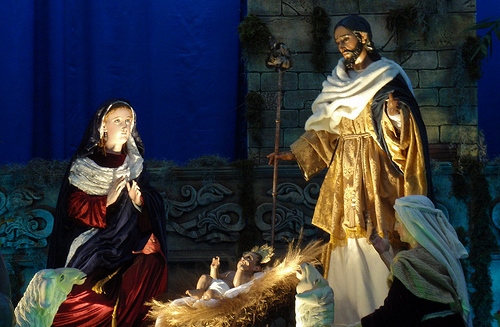This January, we rush from Christmas into Epiphany, the time between too brief. We do that every year and it’s hard on me. I’m a Revised Common Lectionary preacher, but I do wish we could sit and soak in the revelation of Christ a little bit longer. If you happen to be busy at Christmas, or you can’t bear getting out when it’s that cold, or returning shopping gifts on line, then you might miss the whole story. The John 1 text. The Baptism of Christ. Jesus calling his first disciples before he’s a big wig. You might miss how ordinary and unassuming it all is.
The revelations given during Christmas and Epiphany are anything but sentimental schlock, which we tend to make them out to be with our inflatable nativity scenes. Who God reveals himself in this world to be, though humble, is the very basis from which our theology begins because, theologically, you can’t separate the incarnation and the resurrection from one another.
And so, by the time you get to the big miracles, like the unbinding of Lazarus from death, you’ve already missed the important opening scenes. Healing, raising the dead is disruptive stuff, to be sure. But, the Word made flesh? How poignantly can that also unbind a being?
Things with Jesus haven’t changed all that much. We still make movies about him which are either downright disturbing or mawkish. And yet, just like then, as he comes into our midst — calling us to follow, forgiving sin, healing, he remains a mystery in our lives, disturbing what’s what, and we are never able to fully understand him. God’s presence in the world can appear as a still, small voice to be sure, but it also calls forth the dead from their tombs. The reality is that whether God reveals Godself in the manger or on a boat or in a garden, Christ’s revelations are hardly for the faint of heart.
All too often in skimming through the seasons of Christmas and Epiphany, we miss how a small light can shine in the darkness. How what is ordinary now bears the extraordinary promises of Christ. We miss the simplicity of God’s story, God’s revelation, and so it’s no wonder we jump right to the power and glory. And yet it this simple story of God inhabiting human flesh that makes us new.
It seems the church’s job — if we claim Word and Sacrament at its center — to be the singular, prophetic voice in this world telling the Christmas story again and again, undoing us, leading us to our own confessions, leading us out of our tombs to be unbound. Soon, as we leave Christmas behind us and quickly head into Lent, we cannot forget the primary Christian story, a story that at its heart is offensive to our domestic sensibilities.
God has become flesh, entering a world of sin. And this God goes to the cross and dies. God becomes our dust, while we, in turn, are given God’s life and resurrection. The sacred has entered the profane and the world will never be the same again. It seems the church has a wild, absurd, scandalous word to offer.
The task of the preacher, the gift (and burden) of the church, is to offer this Word of Christ to a world that is heavily bound, a world that needs to be made new. And because Christ’s Word promises to bring miracles, we need to prepare ourselves: it might be simple, but it won’t be pretty. This Word summons and heals, and all that is dead is brought to new life.
Our lives are messy stuff. But now Christ, God made flesh, has entered every corner of our world, and there is no place that God is not: the linen cloth that held the Christ child has become the veil that has been torn, and from it we are unbound. Jesus is in our midst. Now, sins are forgiven, wounds are healed, and the dead will rise.
